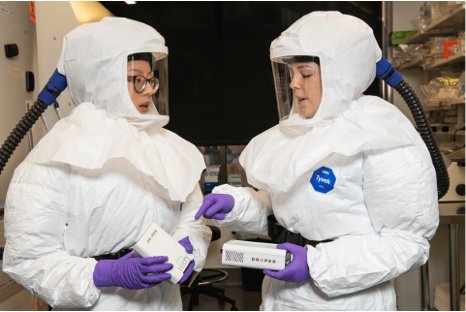-
About
- Leadership & Faculty
- News & Events
-
Admissions
-
Academics
- Graduate
- Advanced Clinical Training
- Continuing Education
- Academic Departments
- Academic Offices
- Simulation Experiences
-
Student Life
- Offices
-
Research
-
- Transformative Research
-
-
Hospitals & Clinics
- Emergency Care
- Hospital Services
-
Community Outreach
- Volunteer
RBL Resources For Researchers
The Tufts New England Regional Biosafety Laboratory (RBL) is available to regional investigators—including scientists from academia, not-for-profit organizations, industry and government—studying biodefense, infectious diseases, and emerging infectious diseases requiring biosafety level 3 (BSL-3) laboratories or animal (ABSL-3) accommodations. With increasing competition for limited funding opportunities, Tufts New England RBL personnel will be happy to provide letters of support, descriptions of facilities and other details necessary for inclusion in funding proposals.
Researchers at the RBL are actively engaged in independent and collaborative work investigating diseases caused by NIAID BSL-3 Priority Pathogens. Ongoing studies involve:
- Mycobacterium tuberculosis
- SARS-2 coronaviruses
- Influenza viruses
- Poxviruses
- Arboviruses
- Enteric microbes
Current RBL investigators at the Cummings School, members of its highly regarded Department of Infectious Disease and Global Health (IDGH), have expertise in multiple Biodefense and Emerging Infectious Disease (BEID) categories; in particular, the biology, pathogenesis, immunopathology, pathophysiology, transmission, prevention, treatment and diagnosis of a wide spectrum of NIAID priority pathogens. Consultation with IDGH scientists is available to support the work of outside investigators.
Additional specific expertise includes:
- Vaccine development and evaluation, including thermostable, micro-needle and needle-free delivery methods.
- Development of animal models for the evaluation of vaccine candidates and therapeutics.
- Development and preclinical evaluation of therapeutic and prophylactic agents.
- Food and water security, involving development of sensitive detection methods for microorganisms.
Research activities are conducted under BMBL 6 Containment Recommendations
Researcher Profiles
Draper Laboratories
The Tufts New England Regional Biosafety Laboratory currently hosts researchers from Draper Laboratories/biotechnology, a nonprofit research and development organization. At the NERBL, Draper researchers are evaluating its PREDICT96 system, an advanced in vitro drug screening and discovery technology for SARS-CoV-2 and other NIAID priority pathogens.

For more information about the New England RBL and how we can assist in your research, email us at nerbl@tufts.edu.


